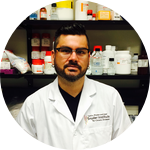About This Project
Our laboratory studies the mechanisms that regulate proper gut function. Infants that are born pre-term are at increased risk of developing necrotizing enterocolitis (NEC), a severe and life-threatening gut inflammatory disorder. Our lab's goal is to better understand the causes of NEC and develop new treatments to protect the gut of the premature infant.Ask the Scientists
Join The DiscussionWhat is the context of this research?
As the survival of pre-term infants increases, so do the rates of gut complications. An immature infant gut lacks the ability to properly regulate its immune system, reacting inappropriately to the normal commensal bacteria that colonize shortly after birth. Necrotizing enterocolitis (NEC) is an inflammatory disease of the gut that is increasing in incidence. The causes of NEC are not understood and in most cases surgery is required to remove the damaged tissue, resulting in long-term health issues in the developing child. The current treatments for NEC have not changed for nearly 30 years. Our lab aims to find new therapies for treating NEC by identifying the key pathways that trigger the inflammation and tissue damage in these premature infants.
What is the significance of this project?
As eluded to in the previous section, we've yet to determine the cause of NEC which hinders our ability to develop new therapies to protect the gut of the premature infant. Thus, it is imperative that we determine what signalling pathways and receptors are involved in initiating gut inflammation in NEC in order to develop new treatments that will block these events. We, and others, have used this approach in the adult population to develop new therapies for the inflammatory bowel diseases, Crohn's disease (CD) and ulcerative colitis (UC). Through a better understanding of the pathways activated in patients with CD and UC, we've been able to develop new therapies for these patients. It is our mandate to take the same approach with NEC to help protect the gut of the premature infant.
What are the goals of the project?
1) To determine the inflammatory pathways that are responsible for initiating the inflammation and tissue damage in NEC.
2) To test whether cell-based immunotherapy can protect the gut of the pre-term infant.
3) To determine drugs used to treat other inflammatory disorders of the gut may prove useful in the treatment of NEC.
Budget
The current project is funded, in part, by an operating grant from the Molly Towell Perinatal Research Foundation. This organization has provided resources for our laboratory to develop experimental models to study the pathways and receptors that contribute to the development of NEC.
Although this funding is adequate for securing the necessary reagents and disposables associated with the study, our laboratory requires additional personnel to perform the experiments.
Thus, we are requesting funding to cover the salary of an undergraduate co-operative education student to run these studies. Our laboratory has employed undergraduate co-operative education students from McMaster University (Hamilton, Ontario, Canada) and the University of Victoria (Victoria, British Columbia, Canada) in the past and they have been extremely productive. For example, 2 of my laboratory's most recent publications were authored by these students, one published in PLoS ONE and another in the European Journal of Pharmaceutical Sciences.
These students are highly motivated, since their laboratory performance is evaluated as part of their degree program.
Should this project be funded in full, we will be able to employ an undergraduate co-operative education student for the period of 12-months, with matching funds from the University of Calgary's Department of Physiology & Pharmacology.
Thus, your support will multiply the resources that will be available to my laboratory in order for us develop new therapies that will protect the gut of the premature infant.
Meet the Team
Team Bio
Originally trained as a smooth muscle physiologist, I have spent the past 7 years examining the regulation of intestinal mucosal homeostasis in the context of infectious colitis, necrotizing enterocolitis and the inflammatory bowel diseases (IBD). During this period, I identified a critical role for the NLRP3 inflammasome in the pathogenesis of C. difficile colitis and IBD, the latter study being cited over 90 times since its publication in 2011. Furthermore, my expertise in inflammasome biology allowed for collaborations culminating in co-authored publications in Science and Nature Medicine.Outside of the laboratory I am an amateur bike racer, competing in cross-country mountain biking, road cycling and cyclocross races. Furthermore, I am the bass player and vocalist in both Heart Failure Research Unit and Hellrazer.
Additional Information

Project Backers
- 26Backers
- 23%Funded
- $1,110Total Donations
- $42.69Average Donation
